
Following a revered contribution to Kluster's recent forecasting eBook, Catherine, Director of Sales Operations at Ometria is back on Klog again to talk through the success criteria for deploying new processes and technologies across the sales team. This time, the Hoxton Hotel was our venue and a delicately balanced green tea our lubricant for conversation. The interview began..
Rory Brown (RB): Whatwas your route into sales ops?
Catherine Mandungu (CM): My initial experiences were verysales focused. Prior to university, I worked in door-to-door sales. Then I wentto university and I also worked for Nationwide Building Society selling creditcards and loans.
Whilst at university, I was keen to do an internship atMicrosoft. At the time I was more interested in finance, so I applied for aninternship in their finance department. I didn’t get the job. But they rang meback to tell me they had a different role in mind for me. In the end, theyplaced me as an education licensing specialist. The role involved working withthe sales teams, but also working with the operating centre who dealt withcontracts and sales processes. I really enjoyed that role because it involved programs,data, training and processes and I was working with a lot of different people.
RB: Why do you thinkthey selected you for that role rather than the finance position?
CM: I think it's because during the interviews it wasapparent that I was good with numbers and that I was a people-person, but I wasalso able to be technical and had an aptitude for processes. I think they justput two and two together.
I didn't know about sales operations at the time. It wasn't a well-known role in the UK then.
After the internship I went back to university. Shortly after, IBM approached me, and I became a technical analyst there. I enjoyed it but it was too repetitive. I realised how much I enjoyed working not only with systems but also getting involved with process improvement, data and people, which is what I had experienced during my time at Microsoft.
So, I went back to Microsoft after that and this time I was working in their sales excellence team which was in fact a sales operations team.
RB: You've got thetechnical background and the sales background. Has that helped you in your rolenow?
CM: Yes. It’s so important to have that understanding of howsales works, how salespeople think, what their goals are, and what drives them.Because a lot of the time, even for something as simple as making a minorchange in a sales system, you need to start by thinking, ‘Why are sales goingto use this? Does this make their life better? What will make them do it? Howcan we incentive them?’
RB: Do you thinkcatering for salespeople slows down processes because you need to think aboutthe human behind it?
CM: I think on the contrary, you will do things quicker if you understand sales. Sales ops is there to support the sales reps. If you don’t understand them, you can’t support them. And if you're just implementing things because you think it will be quicker but you don't understand the salesperson behind it, problems can arise. When you're first learning about sales it might slow you down initially because it's a learning curve but, in the end, you'll be quicker because you will understand exactly what tech stack to employ, which processes to employ etc.
RB: What would youclass as the fundamental categories of sales ops?
CM: I always say there are four parts to sales ops. The first part is data. As a society we're becoming more data driven and that really sits at the heart of sales ops. The second part is processes. The third part is technology and then the fourth part, but certainly not least, is people – they are the drivers of the business.
Sales operations is about trying to build a better eco-system for a business. You almost have to work backwards. Start by thinking what kind of insights you want to get out of the data that will help the business making strategic decisions. Then look at the processes - what processes need to be in place to capture the data we need across the organization. Then uncover where these processes sit, which means looking at the technology. Throughout this process sales ops need to understand and consider the affect this will have on people in the business. Making sure that any process and system implementation is efficient, fixes a challenge and enables the people in the business.
RB: Let's say you'reimplementing a new process or a new system which might involve some technology,getting the salesperson engaged is vital. It won't work if they’re not engaged.How do you roll it out for optimal adoption?
CM: Earlier I talked about how understanding sales helps with implementation. This is important here because before you start talking about change management and enablement, you should already understand what people need when you deploy something in a business.
The first thing you need to do is educate the wider business. A lot of the time, the reasons behind the implementation doesn't get communicated to the wider business. They need to understand why we're doing this, why it's good for the business and why it's good for them. At the end of the day, people (Salespeople especially) aren’t going to do it if they don’t believe it will help them. They are more concerned with closing business as efficiently and quickly as possible. They need to understand that the insights we're going to gain from this new technology are going to help them do that. After education you have to make sure that department leaders have adopted this new way first. It's a challenge but it needs to come from them. It’s impossible to tell a sales rep to adopt a new technology if their management aren’t.
RB: When it comes to conveyingthe value to the team, where does your role and the CRO role cross over?
CM: I think it's a combined responsibility. It's sales ops’ job to educate everyone because they will usually have more in-depth knowledge about what the tech stack does (and so the value that it gives the business) and can therefore train the team. But it's the CRO's responsibility to enforce that and both to oversee it.
RB: If you started your first sales ops role from scratch, what would you do first in terms of implementing technology and processes?
CM: For me, it never starts with process and efficiencies. Itstarts with strategic direction. I need to understand where we're going as abusiness. Then I can start looking at what we already have in place from anoperational perspective and how this supports the business’ strategy. Then youthink, can we do it better? Can we change things? I wouldn't start by divinginto the details. Start with strategy and think about what the business wantsto achieve. Then work back from that.
RB: In yourexperience, how much access do you get to senior leadership like that?
CM: It depends on the business. In my current role atOmetria, I have that kind of access. But at larger organisations I worked inthe past, it was harder because of the structure. Although ideas weredefinitely welcomed by senior leadership.
RB: What are yourthoughts on how to onboard effectively?
CM: I start with the why. Why is it important for them tolearn how to use this new technology? Salespeople’s priority is closing deals,so they need to be bought in as to why this is worth their time. You need to beable to give them examples on how it will help the business and help them as individuals.For example, at Ometria we've just moved to Salesforce. At the start of thisprocess, I needed to communicate to the salespeople why we were changing froman older CRM. They needed to understand that the business was growing, and we couldno longer do everything we needed. We couldn’t build more complex processes asthe business was scaling. They needed to understand that once we were able tobuild the processes, and capture certain data sets we could use the insight tostart working smarter.
RB: Have you ever hada disastrous roll out?
CM: Yes. I was involved in the phase two roll out of aparticular sales technology. The reason it failed was because no one hadconsulted sales on what the processes currently were and what they needed. Ipicked the project up at the onboarding stage and training what was actuallyimplemented was hard because I got a lot of feedback saying it didn’t meet thesalespeople’s needs.
I learnt from that experience that you need a lot ofinvolvement from people on the ground. I decided the first thing I would do wouldbe to sit with everyone in the business to understand how they work and whatprocesses they use. I could then see where the consistencies andinconsistencies in the processes were. It was all about analysing how thoseindividuals worked and how I could bring their working styles together. I thenpresented my findings to the team before I made any changes. This resulted inpeople getting excited about implementing something new because they wereinvolved in the discussion.
RB: Any final wordsof wisdom?
CM: Someone once asked me who should be governing the data. I saw that as a question of two parts: governance of data and ownership of data. In my opinion, the governance of data sits with the ops team. But the ownership of data is with everyone in the business. Everyone is accountable. Ideally, a company wants to build an ecosystem where all the technologies that they've deployed are linked to each other to ensure efficient collaboration between departments and so an overflow of information between departments too. Therefore, it's important for every business to educate their teams about the importance of data and how accountable each individual is.
Then you can move onto the topic of data integrity. This is good for the customers as well as the business. I see sales ops almost as a role model for this.
Want to get more insights from the sales ops leaders? Read our other interviews in the sales ops interview series.
At Kluster, we're big fans of sales operations...
We recognise the growing importance of sales operations. No longer seen as the function that provides spreadsheets, sales operations is integral to building a repeatable, scalable sales machine.
That's why we built Kluster. We make analytics and forecasting systems for you so you can spend time doing what you do best: uncovering trends and delivering growth defining insights.
Kluster gives you total visibility into the effectiveness of your sales machine and helps you generate credible forecasts to revenue leaders and the board.


.svg)
.svg)
.svg)
.svg)










